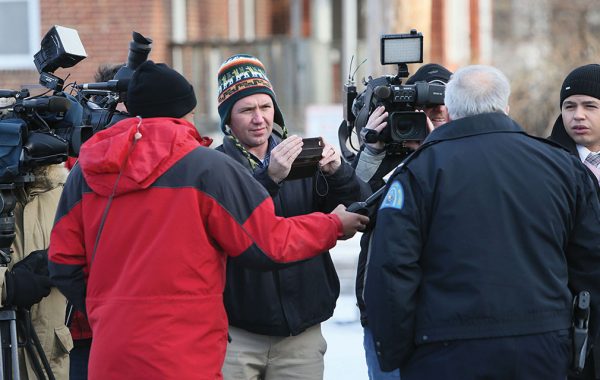As a court reporter for the St. Louis Post-Dispatch, Joel Currier ’00 is routinely exposed to the most heinous acts known to humankind.
Consider these headlines on recent Currier stories:
“St. Louis foster mother charged with fatally beating toddler”
“Jury finds St. Louis County man guilty in fatal hammer attack”
“Getaway driver in deadly St. Louis robbery gets 15 years in prison”
You get the idea. Yet, in the course of his work, Currier looks beyond the daily drumbeat of crime and violence to find stories that shine a light on those who might otherwise be relegated to the shadows. Consider the case of Jadda Kennedy. Last November, Currier wrote a 1,800-word story about the 25-year-old St. Louis mother who had spent nearly a year in jail after a case of mistaken identity led to her arrest for murder. For his work, Currier received the Terry Hughes Award (named for a late Post-Dispatch columnist) for outstanding journalism.
“It’s real-life drama playing out before you,” Currier said of the court beat. “I just find it fascinating.”
Although his father, Frank, was a longtime CBS television correspondent, Currier hesitated to pursue a reporting career. He had no interest in appearing on TV, and he was wary of facing the deadline pressure he’d seen his father deal with. But two years after graduating with a degree in international relations and affairs, he accepted an offer from a fellow Colgate alumnus, David Tyler ’93, who hired Currier as an editor for two weekly newspapers near Syracuse. Currier was hooked.
“It was an amazing year,” he said. “I learned everything about what to do and what not to do as a reporter.”
He went on to earn a master’s degree at the University of Missouri’s School of Journalism and then joined the Post-Dispatch. In August 2014, while assigned to the breaking news desk, Currier was sent to nearby Ferguson, Mo., to report on the shooting death of an unarmed black teenager by a white police officer and the rioting that engulfed the city.
“It was a surreal few months,” Currier recalled. “I couldn’t believe this major national story was playing out in our backyard. I’m proud of our photographers, who won the Pulitzer.”
Currier began working the court beat in 2016. He wrote the story about Jadda Kennedy shortly after her release from jail, encouraged by an aggressive public defender to pursue the larger story behind Kennedy’s arrest. “Sometimes claims of innocence become tiresome,” Currier said. Not this time. Three witnesses had recanted their testimony while Kennedy sat behind bars, he said, but local authorities took their time before acknowledging their error, dropping the charges, and releasing Kennedy. The story only reinforced Currier’s devotion to a career that feels like a calling.
“I love this job,” he said. “It’s holding public entities accountable for serving the public. I discovered this is the career I was meant to have.”
— Christopher Hann







